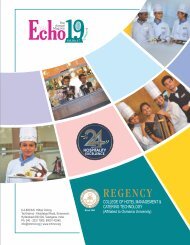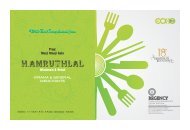ECHO 2016 COLLEGE MAGAZINE
You also want an ePaper? Increase the reach of your titles
YUMPU automatically turns print PDFs into web optimized ePapers that Google loves.
creative writers<br />
Role of Chefs and<br />
Culinary Schools in<br />
Local Food Sustainability<br />
Chef. Harresh Chandra.K<br />
Faculty, Food Production<br />
hough most Professional Chefs are<br />
Tpassionate about feeding people,<br />
the world needs more Chefs that are<br />
just as excited about ending hunger.<br />
Anyone in food service knows that a<br />
huge amount of food gets wasted<br />
between the delivery dock and the<br />
customer's plate. If you need further<br />
proof, the Food and Agricultural<br />
Organization of the United Nations<br />
commissioned a study that found that<br />
about "one third of the food that gets<br />
produced in the world for human<br />
consumption…is lost or wasted" and<br />
this number rises to almost one half in<br />
the INDIA. Ending food waste is one of<br />
the ways Chefs can battle hunger<br />
Solutions to ending food waste<br />
Some of the ways Chefs can end food<br />
w a s t e i n c l u d e c r e a t i n g d i r e c t<br />
relationships with farmers and<br />
offering locally-made food, changing<br />
expectations around visually perfect<br />
food, offering reasonable portion sizes<br />
(or letting consumers choose their own<br />
portion size), composting, and<br />
educating themselves about storing<br />
fresh food for maximum usage.<br />
1. S o u r c e r e d u c t i o n ( d e c r e a s e<br />
purchasing costs)<br />
2. Feed hungry people (increase<br />
revenue from tax breaks for<br />
donating food)<br />
3. Create bio diesel with waste oils<br />
(decrease spending on waste<br />
disposal fees)<br />
4. Create compost to amend soils<br />
(decrease spending on waste<br />
disposal fees and increase revenue<br />
by selling compost)<br />
Chefs have had to keep improving their<br />
recipes and menus to reflect these<br />
needs. Better fats, less salt, smaller<br />
portions and organic ingredients are<br />
just some of the improvements chefs<br />
are making to improve the nutritional<br />
value of their food. And in addition to<br />
being healthy, this trend toward local<br />
food is also socially responsible: it<br />
benefits the smaller, family farms and<br />
organic producers.<br />
Chefs who are making the switch to<br />
local, seasonal ingredients need to<br />
know how to work with small<br />
producers and plan menus around the<br />
varying availability of products, which<br />
poses different challenges than simply<br />
ordering all of their inventory from one<br />
or two national or regional food service<br />
distributors. Ordering Indents from<br />
more than one local supplier to help<br />
local market.<br />
Culinary schools also have a vital role<br />
to play in ending food waste. They are<br />
implementing programs to educate<br />
students and staff about preemptive<br />
techniques to keep food from being<br />
lost, as well as ways to use leftover<br />
food once it has been prepared.<br />
Programs include using food scraps to<br />
create compost that gets sold or used<br />
in the campus vegetable gardens,<br />
converting used vegetable oil for bio<br />
diesel fuel to power campus vehicles,<br />
and donating leftover food to food<br />
banks.<br />
Culinary degree program regularly<br />
update and adapt their curricula to<br />
prepare Chefs for the changing Culinary<br />
World. Changing culinary trends,<br />
updated nutritional information, or new<br />
ingredients all require Culinary<br />
students to master new techniques and<br />
develop new recipes.<br />
You can find traditional and online<br />
culinary classes that reflect the need<br />
for local and sustainable choices on<br />
menus. Sustainability is woven<br />
through many kinds of classes in a<br />
culinary degree program, including:<br />
• Food, Wine, and Agriculture<br />
• Food Ecology<br />
• Restaurant Operations<br />
• Food Politics<br />
• Food Sustainability<br />
Whether you're choosing from<br />
traditional or online culinary degree<br />
programs, culinary school can give you<br />
the most up-to-date information<br />
regarding locally produced ingredients<br />
and sustainable practices,<br />
Food waste is a natural concern for<br />
Chefs who love to feed people. Not only<br />
can eliminating food waste help end<br />
hunger, but it can also save other<br />
resources as well: up to 10 percent of<br />
landfill space, as well as the fuel used<br />
and emissions created to transport it.<br />
Do what you can as a Chef to keep good<br />
food from going to waste.<br />
52 <strong>ECHO</strong> - <strong>2016</strong>
















